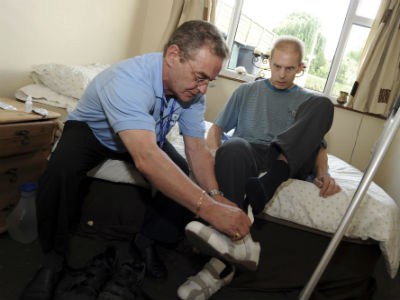
A lack of career structure is preventing the care sector from attracting much needed younger staff according to a report from the UK Commission for Employment and Skills (UKCES).
The report identified care work as the area likely to require the largest increase in staff by 2022 with a forecasted need of half a million more care workers (27% growth). The recruitment need was pressing in the care sector because the average age of current workers is between 50 and 65 meaning many will be seeking to retire over the next 15 years.
However, the research found a number of barriers to recruiting and retaining younger care workers.
Financial pressures and lack of progression
Employers interviewed by UKCES said, along with low pay, the limited time spent with service users, zero-hours contracts, a negative image of social care jobs (due to scandals such as Southern Cross) and outdated ideas that they are “low-skilled” were given as reasons for young people not being attracted to roles and staff leaving the sector.
“Bottlenecks” build up because of limited number of career choice – for example there is often no pathway for people who don’t want to become a registered manager and there are few opportunities to become a senior care worker: the research found 70,800 with this title and 721,200 other care workers.
Working together?
Care employers said issues around status were highlighted when care workers were part of joint teams with NHS staff. Healthcare staff were seen as receiving better pay, benefits and progression opportunities, despite often carrying out similar tasks. Anecdotal evidence suggested many young people were defecting to NHS roles instead.
Although social care staff often specialise in the same way as, for example, nursing auxiliary roles to meet the specific needs of groups such as those with dementia or learning disabilities, the researchers noted that investment in specialist training was less formalised: “It occurs in a more ad hoc fashion and is arguably less a career choice for the individual than elsewhere in health and social care.”
In Norfolk, Health Education East of England, the council, local NHS trust and Norfolk and Suffolk Care Support are piloting an integrated health and social care apprenticeship.
The apprentices who stated in March will each work for six months in community care and six months in an acute hospital setting. The apprenticeship includes the Care Certificate.
The aim is to give a broader understanding of the roles available across social and health care as well as greater insight into needs – for example, the disruption an elderly person experiences when admitted into acute care setting, and then adapting back to their home or residential care environment.
The report calls for the growth in merged teams to be seized as an opportunity to deliver shared training and maximise transferable skills, as well as deliver services in a more joined-up way.
Future career paths
It applauds the Care Certificate which was introduced in April to provide a common induction programme for new social care support workers and healthcare assistants and covers both personal care and more clinically-focussed tasks. The Commission says more qualifications for new entrants, progression opportunities and flexible career paths that allow staff to move between health and social care could stave off a potential staffing crisis.


 ‘Dear Sajid Javid: please end the inappropriate detention of autistic people and those with learning disabilities’
‘Dear Sajid Javid: please end the inappropriate detention of autistic people and those with learning disabilities’ Ofsted calls for power to scrutinise children’s home groups
Ofsted calls for power to scrutinise children’s home groups Seven in eight commissioners paying below ‘minimum rate for home care’
Seven in eight commissioners paying below ‘minimum rate for home care’ Children and young people with SEND are ‘valued and prioritised’ in Wiltshire, find inspectors
Children and young people with SEND are ‘valued and prioritised’ in Wiltshire, find inspectors 
 Facebook
Facebook X
X LinkedIn
LinkedIn Instagram
Instagram
Comments are closed.